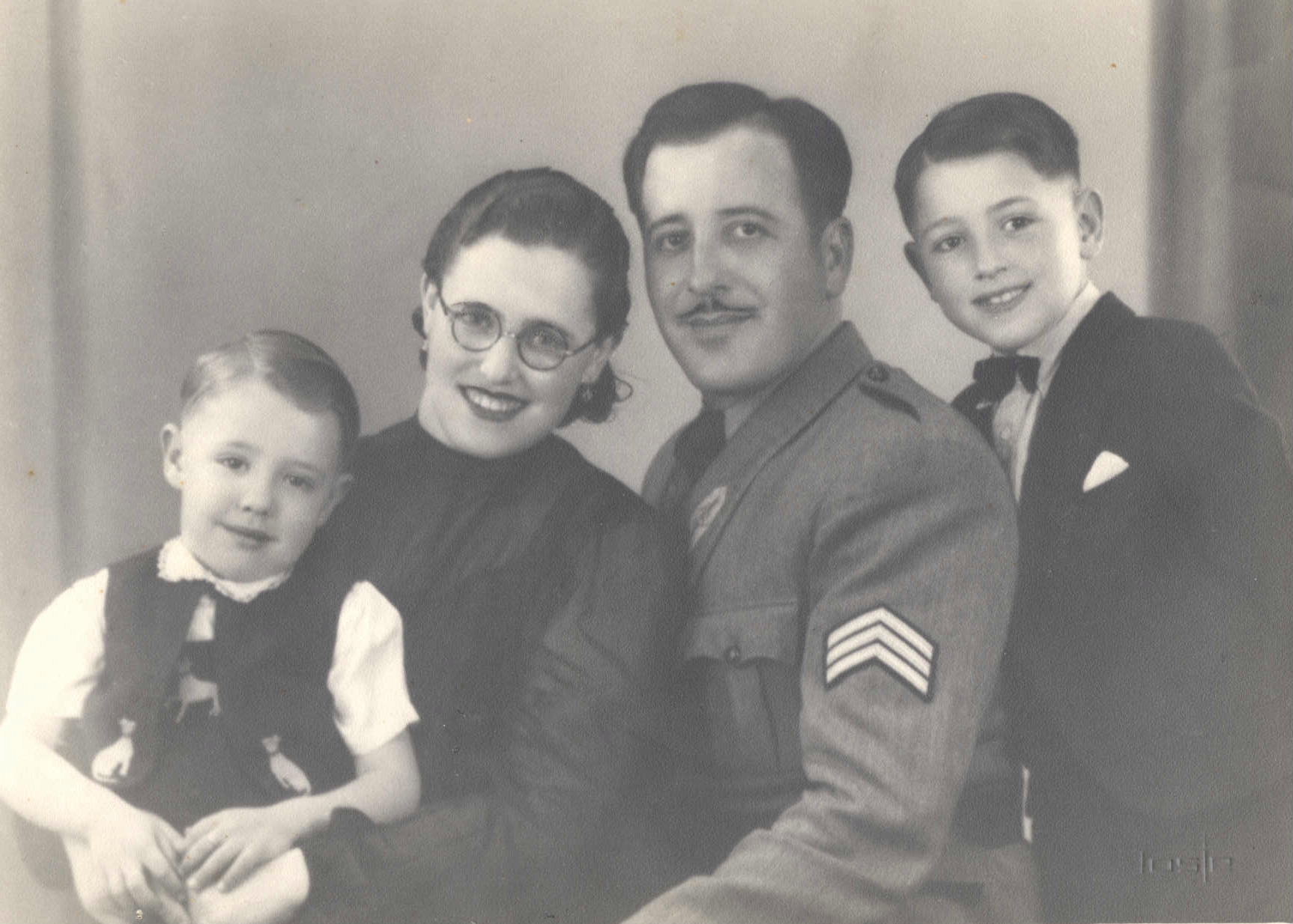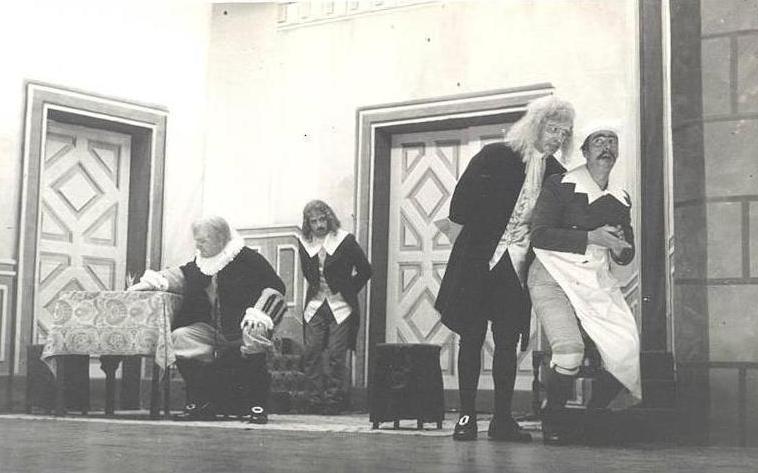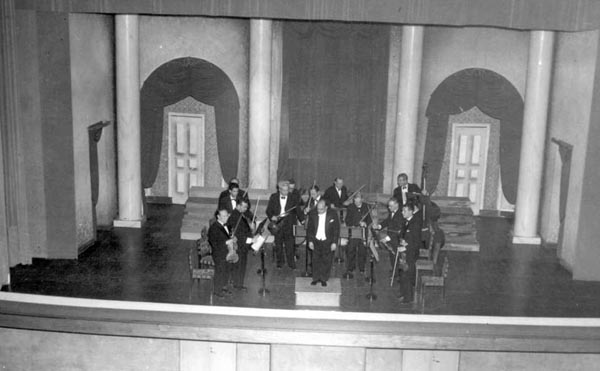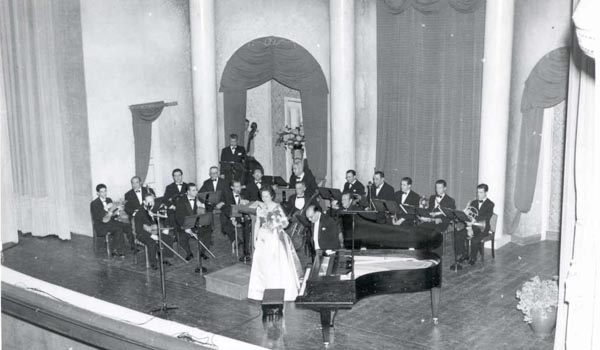 This is the family I grew up in. The year was 1941. The little guy at left is me, at the age of 3 and the handsome young
man at right is my brother, Luis, at the ripe old age of 8. In the center our parents. Our mother Laura and our father Alberto.
I remember us all dressing up and getting ready to go to the
photo studio to take this picture. Remember it because I insisted with my mother to dress me up with my favorite attire:
the vest with the little dogs. It just had to be! Nothing else would do.
This is the family I grew up in. The year was 1941. The little guy at left is me, at the age of 3 and the handsome young
man at right is my brother, Luis, at the ripe old age of 8. In the center our parents. Our mother Laura and our father Alberto.
I remember us all dressing up and getting ready to go to the
photo studio to take this picture. Remember it because I insisted with my mother to dress me up with my favorite attire:
the vest with the little dogs. It just had to be! Nothing else would do.
 A few years later, 1946 to be exact, the same family would look like this. Luis, already in High School, and me struggling with
the last year of "Elementary School". My brother and I grew up in what can be described as a combination of military rigidity,
emanating from my father, well balanced by the much more malleable temperament of our mother who was always ready to try and
accommodate our craziness of youth. Still, we were a close knit group frequently given to end up singing a quasi form of
barber shop quartets, where my mother would sing the lead harmony and my father the base part. My brother and I would be somewhere in
the middle inventing our own harmonies to fit our respective voice registers and trying to blend as best we could. Believe it not,
we would from time to time surprise even ourselves with the quality of our efforts. In retrospect, it is probably a good thing
none of it was recorded so as not to embarrass us today. Tape recorders weren't common in those days.
A few years later, 1946 to be exact, the same family would look like this. Luis, already in High School, and me struggling with
the last year of "Elementary School". My brother and I grew up in what can be described as a combination of military rigidity,
emanating from my father, well balanced by the much more malleable temperament of our mother who was always ready to try and
accommodate our craziness of youth. Still, we were a close knit group frequently given to end up singing a quasi form of
barber shop quartets, where my mother would sing the lead harmony and my father the base part. My brother and I would be somewhere in
the middle inventing our own harmonies to fit our respective voice registers and trying to blend as best we could. Believe it not,
we would from time to time surprise even ourselves with the quality of our efforts. In retrospect, it is probably a good thing
none of it was recorded so as not to embarrass us today. Tape recorders weren't common in those days.
Laura, our mother! Without a doubt one of the kindest and patient women I have ever known. She had to be, in order to put up with us,
the rest of us, that is: my brother and me. Quiet and unassuming, she was born in 1910 in what was then one of the remotest areas of the
Island of São Miguel: the Village of Nordeste. Today, with the building of better roads and modern day transportation
Nordeste is one of the most attractive regions of the Island.
r.jpg)
Our father's work activities kept him away from the house frequently and for long hours and so our mother
actually ran the roost. Even so, she too assumed additional responsibilities of her own volunteering her time
to work for various charitable institutions. At that time, Portugal was a poor and under developed nation and poverty was
rampant throughout the country. Still, governmental social assistance was practically non-existent and it fell to religious
and other private charity organizations to aid and support the really needy. Our mother's focus was to visit and comfort
many families, try to analyze the severity of their respective situations and attempt to secure for them whatever assistance
could be obtained. It was not unusual for the charitable groups themselves to interact in concert and so our mother would
deal with all levels of society, from the very humble to the most affluent. One of the more interesting stories I recall
about her charity efforts relates to a man suffering from tuberculosis unable to work and support his family. At that time,
tuberculosis was tantamount to a death sentence for antibiotics, although in existence, were not yet available in the Azores.
Our mother pressed some of our relatives living in the United States, to obtain the necessary drugs and dosage to help the
unfortunate man. It was not an easy feat. To begin with penicillin and other derivatives were new to the market and to obtain
them proof of need had to be clearly established. To do that from the Azores, a foreign region, turned into a Herculean task
involving medical doctors on both sides and the engagement of influential people in America to make it happen. But it
did, and the first shipment of streptomycin was sent to the Azores as a result of our mother's efforts and the man finally
recovered. That says it all about the person she was. In 1972, after suffering a series of strokes, she passed away
at the young age of 62. We still miss her vibrant disposition always ready to make things better. She did leave but she
is not forgotten.
Born in the Island of Santa Maria, in 1907, our father Alberto, soon realized in his life that he had extraordinary musical
abilities and so, as a very young man, he traveled to São Miguel hoping someday to join the then best musical ensemble
in the archipelago, the Military Band. Of course, in order to have a chance at that, he had to first join the army and
submit himself to a rigid training curricula both in music and higher levels of education.
 Having successfully completed his training and schooling he was promoted to the position of musical cadet, an important
milestone in his dream of becoming a professional musician.
Having successfully completed his training and schooling he was promoted to the position of musical cadet, an important
milestone in his dream of becoming a professional musician.
And so, as my brother and I were growing up, we became accustomed to the musical activities of our father, not only as a
member of the most prestigious regional ensemble but also as a director in his own right very much sought after to rehearse
and conduct many other smaller philharmonic groups throughout the island.
Not content with merely performing the classic repertoire our father joined a group of other musicians who formed what
was then referred to as a "jazz band orchestra".
 In fact, all it meant was that they played music suitable for
dancing in a humble attempt to imitate the more notorious luminaries, à la Tommy Dorsey and others. It is not difficult to
spot him in this picture. He is the tallest in the center holding on to his saxophone. The older gentleman on his right was
then a vice chairman of one of the local banks and their expressions surely attest to the seriousness with which
they all undertook their musical endeavor. I remember remarking on this point to my father only to be told that indeed they took
it seriously and the music was fun to play. I couldn't agree more. I grew up in the ending fringes of that era and sure wish
it had lasted longer.
In fact, all it meant was that they played music suitable for
dancing in a humble attempt to imitate the more notorious luminaries, à la Tommy Dorsey and others. It is not difficult to
spot him in this picture. He is the tallest in the center holding on to his saxophone. The older gentleman on his right was
then a vice chairman of one of the local banks and their expressions surely attest to the seriousness with which
they all undertook their musical endeavor. I remember remarking on this point to my father only to be told that indeed they took
it seriously and the music was fun to play. I couldn't agree more. I grew up in the ending fringes of that era and sure wish
it had lasted longer.
 The year was 1952. My brother and I, both in High School. He, ready to complete his course, and I having just gone through
the equivalent of junior high. The Portuguese middle level school system in those days was very stringent and we, students,
all dreaded it. Typical youthful reaction. Today I am glad to have been a product of that effort. It was modeled after the German
and French programs and made extensive use of two types of schools: the "Industrial Schools" and the "Lyceums". The Industrial
Schools were more focused on curricula geared to everyday applications, like accounting, machinery and the like, while the
Lyceums prepared students for further studies at the University level. Both of us went to the local Lyceum, then called the Liceu de
Antero de Quental, named after a distinguished writer and poet who many years earlier had graduated from it and made quite a mark
in Portuguese literature.
The year was 1952. My brother and I, both in High School. He, ready to complete his course, and I having just gone through
the equivalent of junior high. The Portuguese middle level school system in those days was very stringent and we, students,
all dreaded it. Typical youthful reaction. Today I am glad to have been a product of that effort. It was modeled after the German
and French programs and made extensive use of two types of schools: the "Industrial Schools" and the "Lyceums". The Industrial
Schools were more focused on curricula geared to everyday applications, like accounting, machinery and the like, while the
Lyceums prepared students for further studies at the University level. Both of us went to the local Lyceum, then called the Liceu de
Antero de Quental, named after a distinguished writer and poet who many years earlier had graduated from it and made quite a mark
in Portuguese literature.

And so, with this kind of background, no wonder my brother and I would also have interests in the arts. Only thing is, while I
basically continued the musical tradition, Luis began to show his talents in the theater. And talent he had which
put him on demand to join various productions brought to the local stage, as shown here where he played a leading role
in one of Molière's "haute comédies", "L'Avare" (The Miser) and, not to be out done by his younger brother, dabbling successfully as well in the musical media
as a cast member of a production of the Spanish operetta "El Canto de las Sirenas", seen here on the left sung and acted in Portuguese.
 In retrospect it is a pity that, at the time, the regional theater circles were not more developed because, with his ability and good
looks, I am convinced that he would have been highly successful as a performer were he to be encouraged to pursue a career in that field.
Then again, it is always a difficult call for parents to steer offspring into artistic careers. One is never assured of success.
In retrospect it is a pity that, at the time, the regional theater circles were not more developed because, with his ability and good
looks, I am convinced that he would have been highly successful as a performer were he to be encouraged to pursue a career in that field.
Then again, it is always a difficult call for parents to steer offspring into artistic careers. One is never assured of success.
While my brother was involved with theatrical activities, I too decided to give it a try in the music arena and so began to
study violin hoping to some day be able to play like my idols, Yehudi Menhuin and Jasha Heifetz. I did have a certain ability for music
and advanced fairly quickly but that advance and awareness only made me realize that the Heifetz's and Menhuin's were the extreme rareties. I would
have to set my goals at more modest levels and be content with, say, a position with an orchestra like the Boston Symphony.
 At that time,the BSO was even better known in the Azores than were other groups like the New York Philharmonic but let that
not be a reflection on the merits of the other institutions. It was only a consequence of the make up of the record libraries of the local
radio stations. Going on, in addition to the normal academic studies, I continued my efforts with violin and music theory at the
Academy of Music of St. Michael. There I made some quick progress and was invited to join their chamber orchestra as the lead second violin. To a young
man at the age of 15 playing in that position was indeed a big accomplishment.
At that time,the BSO was even better known in the Azores than were other groups like the New York Philharmonic but let that
not be a reflection on the merits of the other institutions. It was only a consequence of the make up of the record libraries of the local
radio stations. Going on, in addition to the normal academic studies, I continued my efforts with violin and music theory at the
Academy of Music of St. Michael. There I made some quick progress and was invited to join their chamber orchestra as the lead second violin. To a young
man at the age of 15 playing in that position was indeed a big accomplishment.
 But just as rewarding was the opportunity to be in the orchestra accompanying famous soloists as Elsa Klebanowski pictured here at left accepting the
audience applause after playing a piano concerto by Mozart. And so, just to her left in the picture, there I was somewhat
mesmorized by the happening of it all.
But just as rewarding was the opportunity to be in the orchestra accompanying famous soloists as Elsa Klebanowski pictured here at left accepting the
audience applause after playing a piano concerto by Mozart. And so, just to her left in the picture, there I was somewhat
mesmorized by the happening of it all.
By contrast with my brother, my participation in the theater was very limited. Quite frankly, I never felt comfortable acting on
stage as opposed to performing. On the music side, though I would be nervous before any recital, performing came natural to me,
 but I had difficulty with dressing up costumes and putting on all kinds of make up. Still, exactly because of my musical endeavors,
I too was called once to participate in the local production of a play by a very famous XVI century Portuguese author, Gil Vicente, and so, here
I am as a member of a "troubador" trio, in what exactly I didn't like, a funny costume and make up, holding my fiddle
as part of the cast of "El-Rey Seleuco".
but I had difficulty with dressing up costumes and putting on all kinds of make up. Still, exactly because of my musical endeavors,
I too was called once to participate in the local production of a play by a very famous XVI century Portuguese author, Gil Vicente, and so, here
I am as a member of a "troubador" trio, in what exactly I didn't like, a funny costume and make up, holding my fiddle
as part of the cast of "El-Rey Seleuco".
And life went on with each of us pursuing their lives except that even the best laid out plans sometimes have
their detours.
 And so it happened that my brother went to the cinema one day and, as luck would have it, sat next to a lady and her young
daughter who kept speaking English to each other. Never one to allow people in distress he squeezed every
ounce of his English speaking capabilities and offered his services should they need any translation.
Well, as it turned out, the lady herself spoke Portuguese fluently. She had been born in the island but had gone to America
in her youth. She was now back in St.Michael as a tourist showing the place off to her daughter Hilda who in turn had been
born in Rhode Island and grown up in California. Translations therefore were not exactly necessary except that Hilda did not
speak the native language of her mother and so, undaunted Luis offered his services anyway and, one look at this picture well
explains the reason for his insistence. In less than 3 months after that happening my brother and Hilda were married.
And so it happened that my brother went to the cinema one day and, as luck would have it, sat next to a lady and her young
daughter who kept speaking English to each other. Never one to allow people in distress he squeezed every
ounce of his English speaking capabilities and offered his services should they need any translation.
Well, as it turned out, the lady herself spoke Portuguese fluently. She had been born in the island but had gone to America
in her youth. She was now back in St.Michael as a tourist showing the place off to her daughter Hilda who in turn had been
born in Rhode Island and grown up in California. Translations therefore were not exactly necessary except that Hilda did not
speak the native language of her mother and so, undaunted Luis offered his services anyway and, one look at this picture well
explains the reason for his insistence. In less than 3 months after that happening my brother and Hilda were married.

.jpg) To expedite the whole thing, Luis volunteered to serve his military time ahead of the normal age at which he would be called and so into the service
he went for a two year period. At that time I was 14 years old and truly hated to see him going off to join the military forces. I am sure that he also would much
more have preferred to go join his new bride but exemptions from service were not granted.
To expedite the whole thing, Luis volunteered to serve his military time ahead of the normal age at which he would be called and so into the service
he went for a two year period. At that time I was 14 years old and truly hated to see him going off to join the military forces. I am sure that he also would much
more have preferred to go join his new bride but exemptions from service were not granted.
.jpg) On the bright side of things, however, Luis always liked "regimental" things since he was a tender child. Dressing up in a uniform, be it a policeman, fireman
or soldier, was his favorite thing to do during the "carnival" season as we can see here at right where he is dressed in an authentic policeman's costume of the
time. Just as much, looking back on this picture of him as a new recruit it also shows his love for the Army.
On the bright side of things, however, Luis always liked "regimental" things since he was a tender child. Dressing up in a uniform, be it a policeman, fireman
or soldier, was his favorite thing to do during the "carnival" season as we can see here at right where he is dressed in an authentic policeman's costume of the
time. Just as much, looking back on this picture of him as a new recruit it also shows his love for the Army.